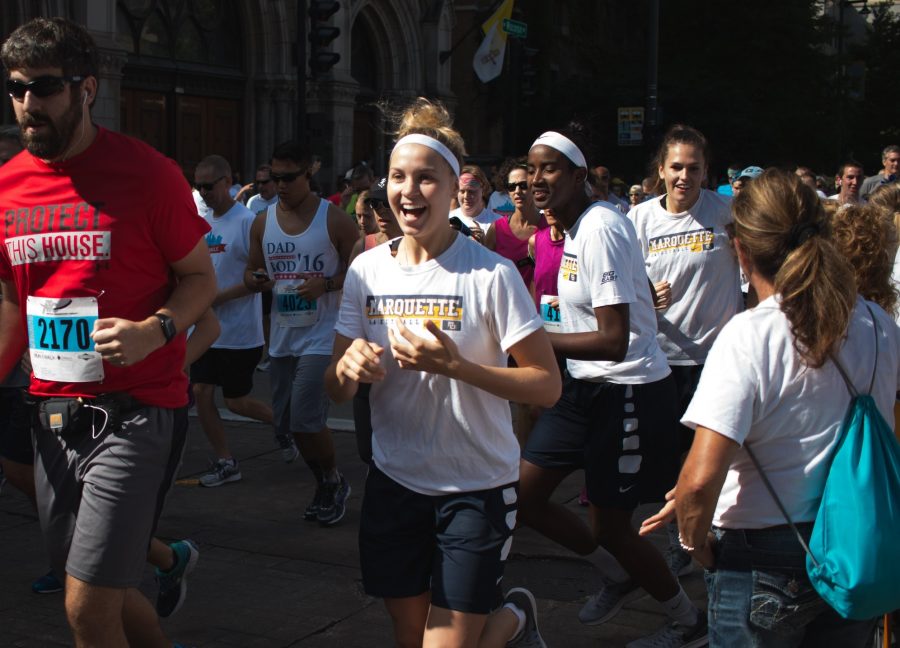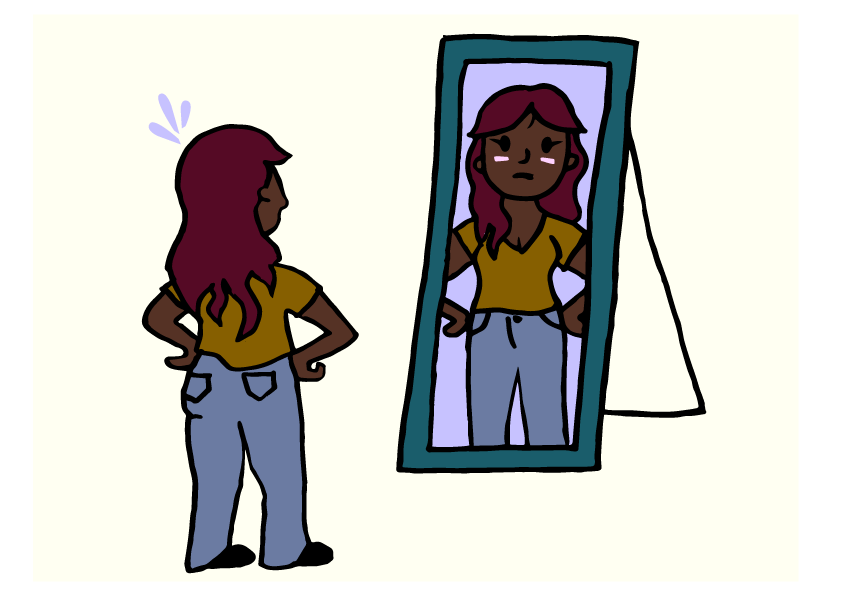Billy Von Reuden is extremely conscious of the amount of food he consumes. Von Reuden, a senior in the College of Health Sciences, is a member of the Marquette men’s soccer team. And as an athlete in a high-endurance sport, he needs to take in more calories than the average college student.
“It’s positive and negative,” Von Reuden said. “Positive because you can really eat whatever and it gets burned off, negative because if you take that the wrong way and you’re just eating crap all day, you’re going to end up burning out on the field.”
But sometimes, Von Reuden can’t make the healthiest decisions when it comes to eating, especially when he travels with the soccer team. He noted that other members of the team are also very aware of the food they put into their bodies.
“Some of the stuff we eat on the road isn’t necessarily the healthiest because it just can’t be, so you’ll see some people not eating this, not eating that,” Von Reuden said.
While it is not unhealthy for an athlete to watch what they eat, there is a fine line between the lifestyle of an elite athlete and the development of serious body image issues and eating disorders.
Balancing the scale
For many college students, balancing academic work, social life and good health is a real struggle. For student athletes, add in three to five hours of workout or practice daily during the season. The pressure to perform well and stay fit on top of the normal stresses of college life can often lead to problems with eating disorders and a skewed body image for athletes.
Todd Smith, head strength and conditioning coach for Marquette Athletics, said it is difficult for athletes to manage their time, but it is crucial for them to stay at top performance and in good academic standing.
“They are being pulled in fifteen different directions,” Smith said. “By me, by the sport coach, by their tutors, by study hall personnel, by their professors, by the registered dietician, everybody. Then, we expect them to eat well and study all night, so their ability to budget time is maxed out.”
Because athletes have so many responsibilities and commitments, they are often very disciplined, said Jennifer Derenne, a consulting psychiatrist for the Counseling Center.
“Sometimes they’re so disciplined that it becomes problematic because they’re not able to achieve balance,” Derenne said. “Sometimes people make the mistake that you have to be healthy all the time, and actually that sets up something that’s really just not realistic for most people to achieve on a long-term basis.”
Derenne said when people try so hard for a long period of time to be extremely disciplined with what they eat, they tend to fall into the other extreme when they get burned out. This often leads to binge eating or other serious issues, such as using exercise as punishment for eating what the athlete might view as too much food or unhealthy food.
“Their participation and performance may have an effect on their ability to stay on scholarship,” Derenne said. “And I think there’s this belief that the more you work out, the more you exercise, the better you are going to be.”
But this mentality can be especially dangerous when mixed with the possibility of disordered eating. Too much exercise and not enough fuel can decrease an athlete’s performance.
Smith said performance is what coaches and trainers focus on, rather than physical appearance.
“You’re not going to get any points for what you look like. You’re going to get points for being in the right place at the right time to make the big play,” Smith said.
Von Reuden said he often struggles with finding the right balance of his activities and healthy eating.
“When you don’t have time to sit down and have a meal, you can’t just eat chips,” Von Reuden said.
Keeping it together
College athletes spend much of their daily routines with their teammates, and as a result form a strong team bond.
Barb Troy, a clinical assistant professor and nutritionist in the College of Nursing, said unhealthy habits can be countered by membership on a supportive team.
“(The athletes) know when they’re with their team, people are going to be watching what they’re eating,” Troy said. “There is going to be a discussion if they’re not eating what they should be eating amongst their teammates and their coaches.”
Ellie Rozumalski, an athletic trainer for the women’s cross country, track and field and volleyball teams, agreed that teams can form a support system for athletes who may be struggling with body issues. She said she relies on members of a team to help her realize if one of their teammates is making unhealthy decisions.
“We rely a lot on teammates because they eat together, they live together, they are together all the time,” Rozumalski said. “They know each other and can tell when something has changed. They notice when someone is maybe not eating or eating too much or always disappearing after a meal.”
A study published in the Journal of Adolescent Health in 2004 showed that young people who regularly ate meals with their families were less likely to develop an eating disorder. Derenne said athletic teams are like the college version of a family.
“If leaders on the team are exhibiting healthy eating patterns and modeling good patterns, that can actually be helpful to teammates,” Derenne said. “It’s better than someone eating all their meals by themselves in their apartment without that feeling of being part of a team and being supported.”
Kristi Laurenzi, a junior in College of Health Sciences and member of the women’s soccer team, agreed that a team is a great support system.
“Especially when you’re part of a team, you have people around you that will help support you and it’s not so much about how you look, but it’s how everyone gets along together and the bonds and friendships,” Laurenzi said. “It’s just one big family and that, more than anything, helps to know that someone cares about you and it’s not just about how you look.”
Von Reuden said he relies significantly on his teammates for support in training. He said it is easier to work hard and be motivated when teammates are there to encourage one another.
“If you’re going to go train by yourself, it would be much more difficult to manage yourself,” Von Reuden said. “(You) would have to be very strict and (you) would have to have really good willpower.”
Rozumalski said while a team mentality can have a positive effect on athletes’ decisions, the effect can also be negative.
“If one person on the team is always talking about how they’re fat or constantly putting themselves down, it spreads,” he said.
Rozumalski said that a lack of confidence in one team member could lead to others losing confidence and questioning their own body image. This could cause widespread problems on a team
Approaching a sensitive issue
Even when surrounded with an emphasis on healthy habits and a healthy team mentality, it is possible for athletes to fall into unhealthy habits or develop eating disorders.
Derenne said not just athletes, but many college students, tend to compare themselves to one another.
“If you have someone who naturally has a smaller frame size … it can be tempting for someone who naturally doesn’t fall at that weight to feel inferior or to feel that they need to work harder at maintaining or controlling their weight,” Derenne said.
For someone who suspects a friend is struggling with body image, approaching the subject can be difficult. Rozumalski said she often has to find creative ways to address such a sensitive situation.
“Don’t just ignore it,” Rozumalski said. “Sometimes you need to dance around it a little and sneak up on them with it or pose it in a different way, rather than straight up asking about how they’re eating, because they’ll lie.”
Laurenzi said she has never had to approach someone with concerns about his or her eating habits and decisions. However, she realizes the difficulty of confronting the problem.
“I think it’s kind of a tricky line because you don’t want to make assumptions about any problems, but just talking to (teammates) and seeing how they’re doing is a big thing,” Laurenzi said.
Rozumalski said an important thing to remember is not to tell someone they have a problem.
“It’s very hard and anyone who has dealt with someone with an eating disorder knows that you can’t just tell them ‘you need help,’ they won’t hear it,” Rozumalski said. “They have to decide on their own … the best you can do is encourage (them).”







